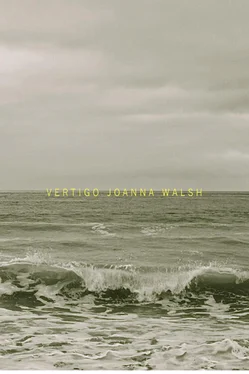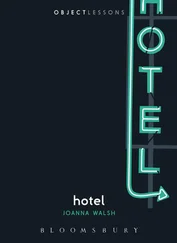They are slim and tan and their slowness has kept them slimmer and tanner than the people who wish immediately to be in the restaurant eating oysters.
He says, “Perhaps they are mooring and are coming to the restaurant to eat.” At that moment, our oysters arrive and are eaten quickly.
All the time we have been at the restaurant there has been the sound of the waves quietly repeating. Vagues, I think, undulate: on-du-ler . The sound of the waves is pitched and modulated precisely so as not to intrude, distract, but so as to remain constantly audible:
perfection.
My daughter has made her first sacrifice to fashion. She has bought a short pink skirt with lace, which does not suit her and for which there is no suitable season or occasion. It will remain unworn, but beautiful. When she wears it, it stops being beautiful. When she takes it off, there it is, beautiful again. For this, she has given up her money.
This holiday was predicated upon spending as little as possible. That was the foremost requirement, beyond “having a good time.” It would not be possible to have such a good time without the satisfaction of having spent so little and, besides, expensive pleasures would surely be less authentic. To sit on the docks after the all-night ferry, now that is something that cannot be bought. And it is easier to combine the pleasure of being very strict, very stern about getting to where we are going, with that of being slowed by the cheapest route, spending very little, except time.
We had come to spend some time here.

Vertigo is the sense that if I fall I will fall not toward the earth but into space. I sense no anchorage. I will pitch forward, outward and upward. It is worst driving up the mountain to the guesthouse, where the road turns rollercoasterward, only avoiding an unseen drop by a corner, skirting logs scaled like the tortoises glued by gravity to the road.
At the turn of the road, willing the world to continue a little space, there is a man, a woman, and a child. They are not tourists: there are few here. From the outside, the man is greater than the woman, who is greater than the child. The child is brighter than the woman, who is brighter than the man. Of their insides, we know nothing, because we cannot understand the words that turn those insides out. I grasp at words in this language with other languages I know, languages other than the one I mostly speak, as though one foreignness could solve another.
Apart from the ascents, it’s the nights that are hard, under lead blankets. The dark leaves replay over the light, then night falls curtainwise. I say “falls,” weighted — nothing to stop it — outwards and upwards as well as down. No streetlights of course: no streets. Heat doesn’t linger. Cold drops with (like) the dark.
Dinner? Only for the interruption of the boredom that replaces blank space in which I would usually make the family food, and which is now filled by drink. Beer first, not wine; I will get drunk more slowly. Drunk. Something that happens to you, like a glass of water, and that happens in the past tense, even as you are drunk in the present, as the action taken to provoke the state was taken in the past. You drink and then you are drunk. That’s all there is to it. But I drink more slowly when I become used to bridging this space, like you. You do it every day.
I turn discretely to take the last of the wine dregs filled with something like tea leaves.
The red lead blanket with white crosses, a disaster blanket. I like to have it near me.

People forget how far things are. When we returned in the evening, the owner of the guesthouse was disappointed that we did not walk to the limit of the ruin. At first we feel disappointing, but then we notice how old she is. She is tough, but she cannot have walked to the limit of the ruin, or not for a long time.
At the ruin, the light-colored people do different things from the dark-colored people. The light-colored people sit in the debris of the ruin. They look, from there, at other buildings in the ruin. I cannot tell whether they are happy or not. Sometimes they take out a bottle of water, some bread, some tomatoes, some salty sheep’s cheese, some crisps, some olives, and spread these out beside them on the stones.
The dark-colored people sit on plastic picnic chairs between the ruin and the hut. They do not enter the ruin; they do not look at the ruin. They work there. Sometimes they sit with things they are selling, sometimes with glasses of tea or (or, and) cigarettes. They do not eat, or if they do their food is on a plastic table, not balanced on a rock.
The light-colored people wear light clothing that does not cover their bodies. The dark-colored people wear dark clothing that covers their bodies entirely and sometimes also their heads. The dark-colored people do not acknowledge the strangeness of the light-colored people, in fact they do not acknowledge them at all but dwell by them as peaceably as by the sheep or cattle that also sit, and eat, in the ruin.
From the middle of the ruin a whisper can go anywhere.
We sit in the ruin, each reading a book, or three of us read out of four. Three different voices speak to us. We have taught the children to read again this week. Here, where there is no voice, apart from ours, they are desperate for any other. They will even sing to themselves, sometimes. The boy whistles. He makes his voice croak. He sings the same thing again, but breathing in. A bird echoes the first notes of Vivaldi.
I wish you hadn’t told me about the stone. Of course I also wish it had been me. I had already dreamed of a piece of acanthus leaf, unobtrusive egg-and-whatever carving, a perfectly single pebble, pocketable among the ruins — but I’m not the one who found it. As I searched, my glance purposely turned to smaller stones, to twisted wood. The ground here has an air about it, a purpose: it focuses on the fallen. It’s to do with vision, seeing straight. My eyes turned away from my mind’s purpose — or toward it, which may also have been away from it. My mind does not tell me everything it thinks.
My mind thinks, furiously, you must know I will have to leave you, will have to go with the children when they catch you, my duty to go, at the gate here, at the airport. You are a fool. You will risk yourself for it, the stone, and you do not belong to yourself. You will risk yourself selfishly, for you are also yourself-in-us. My mother catastrophes in me. I hear her shrill: “They will throw him into a dirty foreign prison!”
You will probably get away with it but I will know that you have risked all that.
The people working in the field beside the ruin come and go. We can see them because they wear dark colors: the men always at a distance, carrying something, the women, brighter and more complicated, stooping over by the buildings, sweeping or cleaning.
Would it matter if you took it? Would they ever miss that stone? The pillars are laid out in rows in their field hospital. In this section the stones have tumbled, are frozen, falling. When will they follow? They will choose their moment.
“Don’t touch,” I tell the children. My mother says in me: “Prison! They will fine you.” Out loud I say, “THOUSANDS.” The children say, “No, hundreds. They wouldn’t charge that much.” They are right. I am ridiculous as her, a fool indeed. My own children told me I must be wrong, and I was. I am ashamed to have thought anything so stupid, to have thought it without thinking, but there it is. I am a good cook, and I can keep the house clean. I have a job, even. But, sometimes I see no more than is in front of me. There are times I should just keep quiet. That’s what the younger generation teaches me. They take the words out of my mouth, which I tasted for such a short time after I snatched them from the generation before. I’d thought the words were mine. My children have reminded me I was wrong.
Читать дальше












